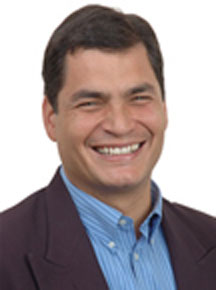QUITO (Reuters) – Two private polls showed Ecuador’s leftist leader, Rafael Correa, comfortably won yesterday’s referendum on judicial and media reforms that opponents say are a power-grab threatening the Andean nation’s democracy.

As voting ended, Foreign Minister Ricardo Patino also told Reuters the government believed it had won. “We have information that effectively shows the president has triumphed in practically all of the provinces,” he said.
If confirmed, the result would strengthen the already popular Correa’s standing in the South American OPEC member and put him in a strong position for a re-election bid in 2013.
A private tracking poll by Cedatos-Gallop showed an average of 57 per cent of voters backing all 10 questions on a referendum that was essentially a vote of confidence on the flamboyant Correa, 48, who has governed since 2007.
An exit poll by Santiago Perez Investigacion y Estudios showed more than 60 per cent said “Yes” to all questions.
“We’re really happy!” Patino added.
Official results were due later yesterday.
Correa has maintained high popularity among the poor and lower-middle classes thanks to big spending on schools, roads and hospitals. Rivals accuse him of an authoritarian streak akin to his ally Hugo Chavez, the president of Venezuela.
“We’re giving Correa too much power, but it doesn’t matter. Someone has to tidy up this mess,” said “Yes” voter Cesar Acosta, 67, echoing Correa’s original justification for the vote to root out graft and inefficiency in courts.
The most controversial two proposals set the foundations for a new justice system in which Correa will have more direct say over appointments. He argues that corrupt judges have to go so police can better fight crime, a huge concern for the South American nation’s 14 million people.
“Correa will have the ability to restructure the court system and essentially hand-pick judges … (which) will further concentrate power in the executive and limit checks,” political risk consulting firm Eurasia Group said.
Other reforms include more controls on media, with whom Correa has been duelling regularly, and a ban on bullfights.
